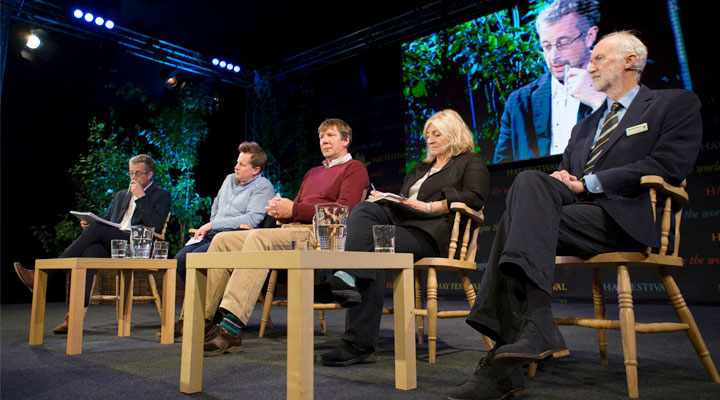Pasture farming is fairer farming
The debate was attended by around 200 people, a mixture of farmers, consumers, scientists and journalists, at the annual literature festival held in the Welsh border town of Hay-on-Wye.

Russ was joined on the panel by Jonathan Hughes, general manager for the National Trust in Pembrokeshire, Rosie Boycott food advisor to the London Mayor and Professor Simon Blackmore head of engineering at Harper Adams University. In the chair was Andy Fryers, sustainability director for Hay Festival.
Consulting the membership
Before the debate Russ posed the question ‘What is fairer farming?’ on the PFLA member’s forum and was inundated with many useful points, which he was able to convey to the audience at Hay.
In particular, he advocated:
- a need for better collaboration in food supply chains
- for farmers to work together more
- for no more legislation, but for what exists to be better implemented
- more empathy from politicians for food producers
- a fairer deal for consumers who are often misled by seemingly cheap food.
At present farmers are taking a smaller and smaller proportion of the retail value of food, which impacts on their wellbeing, the welfare of their animals and their soil, resulting in poorer quality, less nutritious food.
Jonathan argued for better recognition of other public services offered by the land such as access to the countryside, environmental schemes and carbon storage, much of which is currently being subsidised by the taxpayer.
Simon made the case for technology, which could help farmers achieve more but with greater resource efficiency. Although there were some questions over cost, there are a multitude of devices currently on the drawing board, which could be very useful in a wide range of farming applications.
Pasture meat is a fair product
Rosie acknowledged the need to re-educate consumers as there is a strong correlation between food poverty and knowledge. Russ put forward the ‘Pasture for Life’ brand as a fair product backed up by excellent health, quality and environmental credentials.
The use of QR codes on packs of Pasture Meat, to help explain the often-invisible story of how meat is produced is being applied by the PFLA’s certified butchers. This principle, he said, could be applied to other foods to help educate consumers about what they are buying and why their eating choices affect the way Britain farms.
Food authenticity
There were a number of excellent questions and points from the audience. The consumers were especially concerned about the authenticity of some of the food labels or claims they see, questioning whether being able to buy two chickens for a fiver, will have been fair to anyone involved.
A member of the audience, Anne Cottringer from Hereford, said: “Farming is very diverse, especially in Herefordshire, where we can grow just about anything, and feeding the likes of London, Beijing or Jakarta, probably also requires a diverse approach.
“As a consumer I am always interested in my food, and find it fascinating how some of it is produced, but it’s not always easy to find out such things. If I knew more, I might support local farmers even more, who I believe are producing food in the best way possible.”



